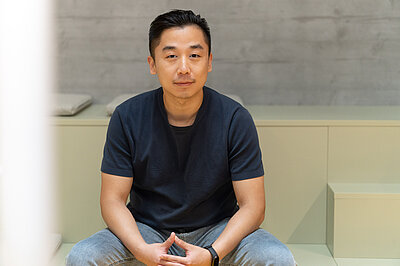Chong Li, Postdoctoral Fellow
Chong Li spent six years as a postdoctoral fellow at the lab of Jürgen Knoblich at IMBA, where he studied neurodevelopment with brain organoids. Chong will soon return to his homeland China as the newest group leader of the Chinese Institute for Brain Research in Beijing. We sat down with Chong to ask him about his experience at IMBA and how it helped him get his new position.
Before I came to IMBA, I did a PhD at the University of Miami Leonard M. Miller School of Medicine, where I used Drosophila as a model to study how genetic variants contribute to neurological disorders. After my PhD, I was very interested in working on disease modeling with stem cells and organoids, and I knew that the lab of Jürgen Knoblich at IMBA were pioneers in the field of cerebral organoids. Jürgen was extremely welcoming, and I was impressed by the exciting projects that were ongoing in the lab, as well as the facilities and resources available, so I joined as a Postdoc in August of 2018.
I developed a novel system, called CHOOSE, that combines CRISPR technology and single-cell sequencing in brain organoids. This new system allows us to have unprecedented resolution in studying the effects of genetic mutations in diverse progenitor and neuronal cell types inside a larger brain structure – we can examine the impact of single mutations at the single-cell level. Using CHOOSE, we uncovered more about the cell types, molecular pathways and gene regulatory networks involved in autism.
Although the topics and models are quite different, the level of PhD training I had previously received allowed me to adapt quickly. However, having ready access to experts in the Knoblich lab was essential for learning to work with organoids. In addition, the highly professional Core Facilities, especially the BioOptics, Next-Generation Sequencing and Bioinformatics facilities, provided invaluable technical support and helped streamline my research. And, of course, Jürgen was extremely supportive of my project and provided guidance and advice throughout.
I will be taking a Group Leader position at the Chinese Institute for Brain Research in Beijing. My new research group will build upon the technology that I developed at IMBA, combining disease modeling and functional genomics to study brain development.
At IMBA I learned that, as a scientist, it is essential to be open-minded. Here, people study very different topics with unique approaches, and being exposed to that scientific diversity and the diverse ways of thinking widened my perspective. Also, as a postdoc, I learned to take ownership of a project and be the driving force leading to its completion. But I also learned that involving other people with different expertise can elevate the level of my science. And of course, the reputation of the institute and the Knoblich lab, as well as the pioneering aspect of my research, were important factors in helping me be competitive in the job market and get this new position.
I am always inspired by people with a strong passion for science and constantly pushing the boundaries of technology and knowledge. Science is not easy; persistence is one of the key elements to moving it forward. Also, I would like to replicate the inclusive and diverse environment that I found at IMBA and the Vienna BioCenter, where everyone has their own voice and the freedom to explore what they are curious about. This philosophy, combined with positive criticism and independent thinking, produces amazing science. I would love to apply this mentality in my new research group.
